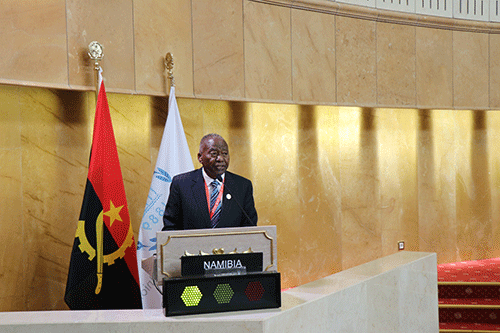George Sanzila
LUANDA – In spite of Namibia inheriting inequality from policies of the then-apartheid regime, it has since adopted many initiatives that are redressing this anomaly, National Assembly Speaker Prof Peter Katjavivi has said.
He made these remarks Tuesday during a general debate on the theme “Parliamentary Action for Peace, Justice and Strong Institutions” attended by hundreds of members of Parliament gathered at the 147th Inter-Parliamentary Union (IPU) session.
Katjavivi said numerous pieces of legislation have been passed to promote peace, justice and strong institutions.
“From social protection grants to affirmative action, we have made strides in gender representation, with 47% of our Parliament consisting of women. We strive to promote free primary education, and have enacted the protection of Whistleblowers’ law. Our commitment to justice is evident through Acts combating domestic violence and rape, and amendments to promote access to justice for all. Our Access to Information Act enhances transparency and accountability,” he noted.
The speaker stated that the Sustainable Development Goals (SDGs) have been integrated into national development plans for ease of implementation and review, with parliament playing a critical role in holding the executive to account.
He then said Namibia will remain indebted to Angola for its selfless efforts of providing refuge to countless Namibians during the bitter days of the struggle for independence.
“I would like to acknowledge the pivotal role the government and the people of Angola played during the struggle for Namibia’s independence and freedom, and particularly the historic battle of Cuito Cuanavale here in Angola between 1987 and 1989,” said Katjavivi.
He also implored fellow lawmakers to work towards maintaining peace and justice for all, observing that Namibia was deeply concerned about the ongoing conflict between Israel and Hamas, which has resulted in the loss of many human lives. “The escalation of this conflict is raising particular humanitarian challenges, and we appeal for de-escalation. We fundamentally support a permanent two-state solution to be found within the relevant United Nations resolutions,” said the speaker.
He is also the vice president of the IPU task force on the Russia-Ukraine conflict, whose activities were discussed during the plenary.
During the official opening which preceded the plenary, Angolan president João Lourenço emphasised the importance of parliamentary diplomacy, and the need for the peaceful resolution of conflicts.
During the assembly, all IPU statutory bodies such as the Governing Council, Standing Committees, Committees on the Human Rights of Parliamentarians and on the Middle East Questions, as well as the Forum of Women Parliamentarians and the Forum for Young MPs, will meet. The Governing Council is further expected to elect a new IPU president, while the conclusion of the assembly will culminate in the adoption of a final document on the overall theme of the general debate.
Speaker Katjavivi is leading a delegation of Namibian MPs which includes National Assembly members Lukas Hamata, Fenni Nanyeni and Bernadus Swartbooi, with National Council (NC) vice chairperson Victoria Kauma and fellow NC MPs Emma Muteka, Elder Felipe and Nicodemus Motinga.
The IPU Assembly is a global organisation of parliaments around the world that brings together lawmakers to identify international challenges, and make recommendations for action.
*George Sanzila works for the National Assembly in the Division: Research, Information, Publications and Editorial Services.


